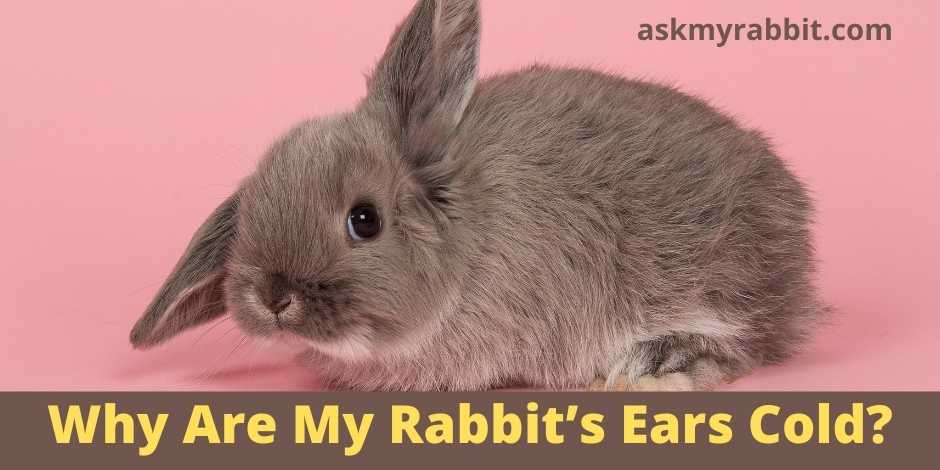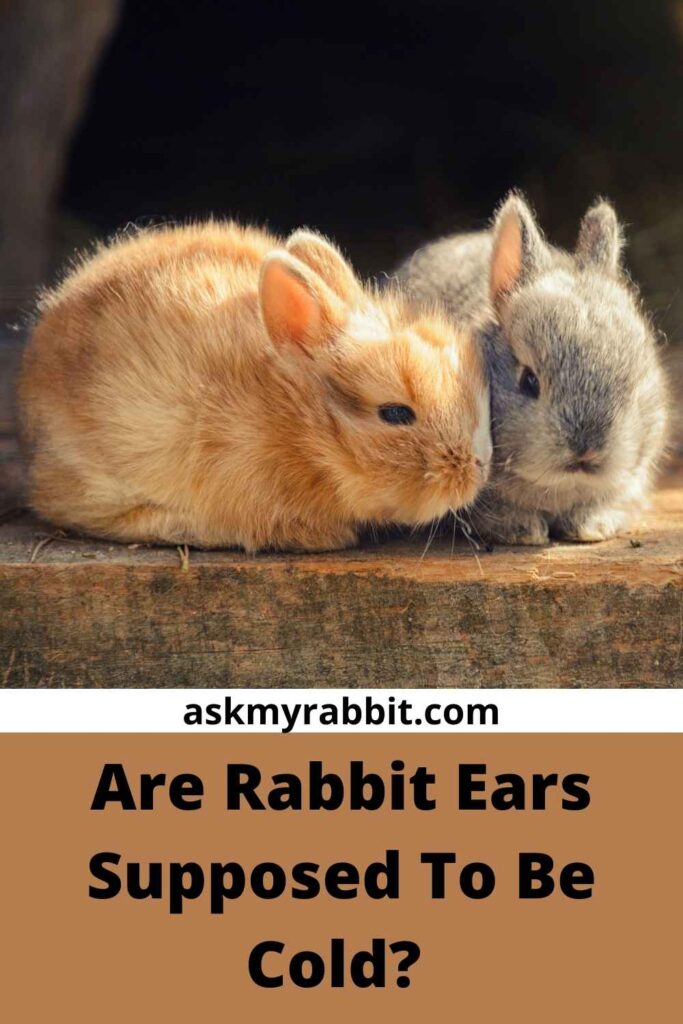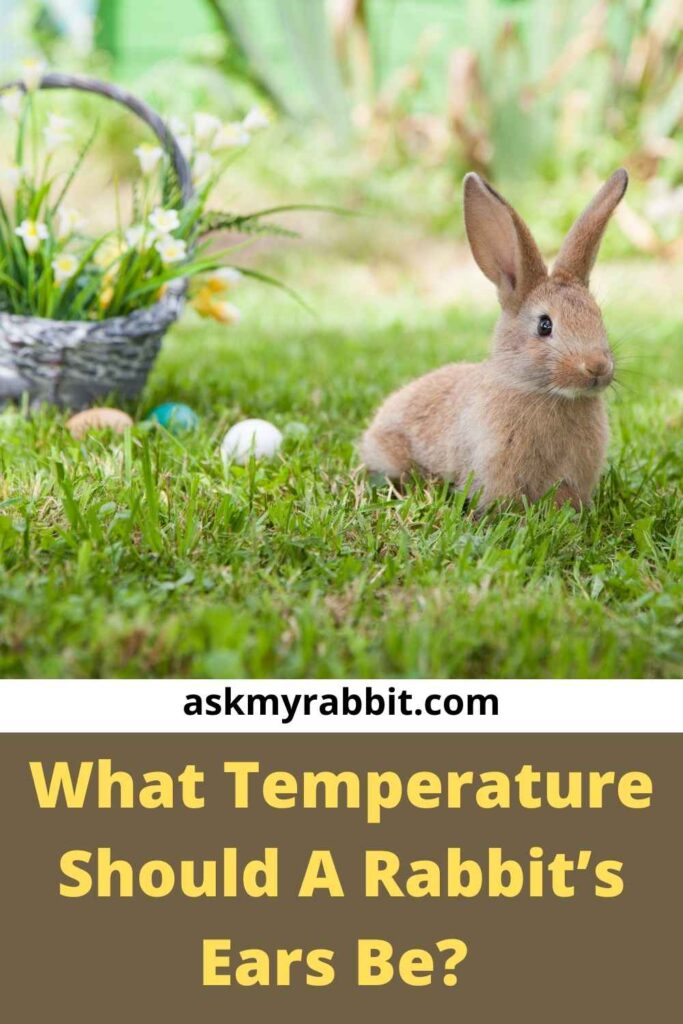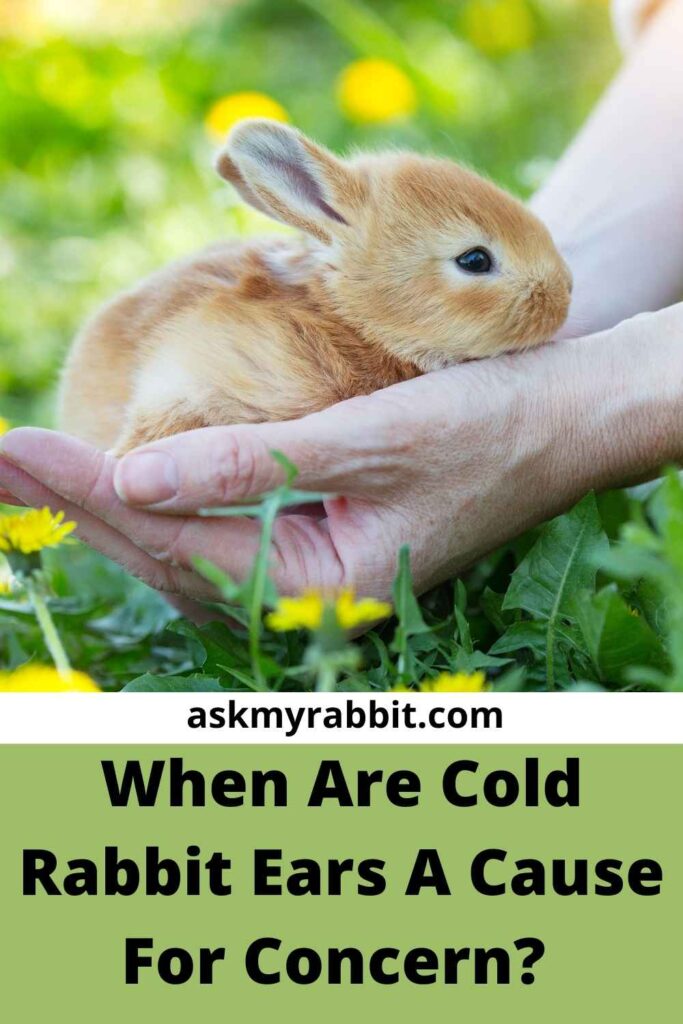It’s not always simple to tell whether a rabbit is unwell. Therefore, as a bunny parent, you should for significant temperature swings. A rabbit with chilly ears is, understandably, a subject of anxiety.
Rabbits are at the bottom of the food chain in the wild, and they have a natural need to hide their injuries and diseases. You may get concerned when you find that your rabbit’s eats are cold.
Rabbits use their ears to control their body temperature. When a rabbit is warming its body, its ears might feel chilly or frigid to the touch. This is especially prevalent in the winter or when the weather is windy.
Rabbits largely adapt to the cold by minimising heat loss via their skin. When it’s chilly outside, a rabbit will cuddle up and drop its ear temperature to keep its body warm.
If you want to know more about the habits and lifestyle of your pet bunny, keep reading!

Is It Bad If My Rabbit’s Ears Are Cold?
When determining whether or not your rabbit is unwell, keep in mind that rabbits are at the bottom of the food chain. As a result, rabbits have an intrinsic need to conceal their ailments and injuries. While this may be a smart survival strategy in the wild, masking symptoms in domestic rabbits merely misleads their caregivers and delays urgent medical assistance.
No, it is not necessarily bad if your rabbit’s ears are cold. Rabbits use their ears to control their body temperature.
However, a fever or a dip in body temperature might be indicated by very chilly or hot ears. This, along with other warning indications, may need a trip to the veterinarian.
People who live with rabbits must be especially aware of small changes. If your rabbit normally welcomes you with leaps and bounds, but now lies at the rear of the cage, this could be cause for concern.
When you combine this with the fact that there are no droppings in his litterbox or there is still a lot of hay from the previous night, you might have a sick rabbit.
What To Do If Rabbit Ears Are Cold?
In most cases, a rabbit with chilly ears isn’t a cause for concern. Rabbits use their ears to control their body temperature. Excess heat will be expelled through the ears rather than sweating, keeping the rabbit cool.
Rabbits fare well in cold weather. However, as the temperature increases, they become more vulnerable to heat stroke and dehydration. The rabbit’s life might be jeopardised if he can’t get rid of excess heat through his ears.
If your rabbit’s ears are cold and it refuses to eat, contact your veterinarian right once. Ileus, a gastrointestinal disease, is the most prevalent cause of lack of appetite in rabbits.
When the regular contractions that occur inside a rabbit’s intestines to drive food through the digestive system diminish or cease, the issue arises. Ileus is a deadly disease that can be life-threatening in rabbits if not treated.
Does Rabbit Cold Ears Indicate They Are Lethargic?
Rabbits with cold ears may indicate that they are lethargic. Rabbits reduce heat loss via their skin to acclimatise to the cold. Shivering is not a reaction that rabbits have to cold temperatures.
You bunny uses it’s ears are used to keep their body temperature in check. To avoid heat loss from its body, a rabbit will curl up and reduce its ear temperature in the cold.
When accompanied by additional signs such as tiredness and lack of appetite, cold ears in rabbits might suggest an illness. A decline in body temperature is signalled by very chilly ears. Cold ears, when combined with other symptoms, may need a visit to the veterinarian.
Are Rabbit Ears Supposed To Be Cold?

Yes, rabbit ears can be cold at times. When the ambient air temperature is substantially lower than the rabbit’s core temperature, it’s natural for their ears to feel cold. The blood circulation from the body to the blood vessels in the ear lobe helps a rabbit regulate its core temperature.
A rabbit’s ear lobes are supplied with an enormous meshwork of blood capillaries that may be constricted or dilated, according to research. The blood arteries in the ears constrict as the body temperature lowers. This reduces blood flow to your bunny’s ears.
Rabbits have huge ears with a small amount of hair on the exterior and nearly none on the inside. Winter tolerance is higher than heat tolerance in rabbits. The size of the ears, along with the absence of fur, permits body heat to escape more easily in hot conditions.
Rabbits fold their ear pinnae in the winter to keep the interior surface from being exposed to the outside air. They’ll also pull their ears closer to their bodies. This helps reduce heat loss through convection, radiation, and evaporation.
When the rabbit’s ear temperature is lower than the ambient temperature, it may absorb heat and keep its core temperature between 102 and 103 degrees Fahrenheit.
Do Rabbits Use Their Ears To Cool Down?
Yes, rabbits use their ears to cool down. Your bunny’s large ears provide an expansive surface area of exposed skin loaded with blood vessels.
This blood-circulation-based cooling system helps to prevent overheating and keep the rabbit’s body temperature below safe limits. It keeps your bunny cool.
What Temperature Should A Rabbit’s Ears Be?

A rabbit’s body temperature can vary by several degrees between individuals and by time of day in a specific rabbit. As a result, the normal temperature range is 100.5 degrees Fahrenheit to 103.5 degrees Fahrenheit.
If your rabbit is worried, the temperature may rise to 104 or even slightly higher. Furthermore, the temperature may be slightly warmer in the late hours.
Your bunny’s ear temperature should be about 101-103°F. When they are trying to save heat, their ears may be chilly. When they are trying to disperse heat, their ears may be warm.
Even if a rabbit is calm and only transmitting regular blood flow via their ears, its body temperature is around 101-103°F. This might feel warm to a human’s touch.
Taking your rabbit’s temperature at several times is the greatest approach to figure out what is typical for him. Additionally, being comfortable with and good at taking your rabbit’s temperature helps lessen stress and provide a normal result.
Are Rabbit Ears Supposed To Be Warm?
Yes, a rabbit’s ears can be warm. Rabbits are unable to properly sweat or pant to remove body heat. Thus heat exchange through the ears, which contain a huge network of blood veins, is their primary thermoregulatory mechanism.
Rabbits generate heat from all of their bodily parts. However, there is a large network of blood arteries that collects in the area surrounding the ears. This is where increased thermic exchanges occur.
A rabbit can retain body heat by chilling its ears and blocking heat flow to the environment when it is too cold. Rabbits use their ears to control their body temperature.
A fever or a dip in body temperature might be indicated by very chilly or hot ears. This, along with other warning symptoms, may necessitate a trip to the veterinarian.
When Are Cold Rabbit Ears A Cause For Concern?

Cold rabbit ears is a cause for concern if you bunny also stops eating or pooping. In addition to other symptoms, a sick rabbit may have cold ears. However, cold ears are rarely a cause for worry on their own.
Rabbits, like most animals, become ill for a variety of causes. Infections in rabbits are caused by microorganisms, swallowing anything that might induce an allergic reaction, and being genetically susceptible to a disease.
When paired with other signs like tiredness and loss of appetite, cold ears in rabbits might suggest an illness. A decline in body temperature is indicated by very chilly ears. Cold ears, when combined with other warning signals, may necessitate a trip to the veterinarian.
Rabbits, being at the bottom of the food chain, have a tendency to hide indications of disease. When they show signs of frailty, they put themselves at risk of being pursued by a predator.
Domestic rabbits are not at risk. However, their unwillingness to display symptoms of sickness might mislead pet owners and prevent them from getting medical help when it is required.
This is why, when caring for rabbits, keeping an eye out for subtle signals such as physical and behavioural changes is so important. When your rabbit’s ears are chilly, see if it’s displaying any other signs of illness.
Frequently Asked Questions
What Temperature Is Too Cold For Rabbits?
Rabbits can survive in extremely cold conditions. However, even for healthy adult rabbits, temperatures below twenty degrees Fahrenheit may be too chilly.
Is My Bunny Dying?
Refusing to eat, unusual lethargy or an abrupt change in vital signs are all symptoms that a rabbit is near death.
Can Bunnies Get A Cold?
Rabbits are immune to human colds. If your bunny pal is sneezing or has a runny nose or eyes, they may have an upper respiratory infection. This should be examined by a veterinarian as soon as possible.
Final Words
Rabbits are amazing creatures with a variety of biological functions that are unique to them. Many people are unaware that a rabbit’s ears are capable of much more than hearing.
One of the reasons for their ears being unique is that they have a larger surface area. This allows heat to escape and maintain the rabbit at a comfortable temperature.
While this is the most prevalent cause of cold ears in rabbits, you may also find that it is connected to sickness on occasion. It’s crucial to spot other indicators of illness, as rabbits are notorious for concealing medical problems.
If you have any more doubts regarding your pet bunny, we request that you drop it in the comment section below. We will answer them soon!






